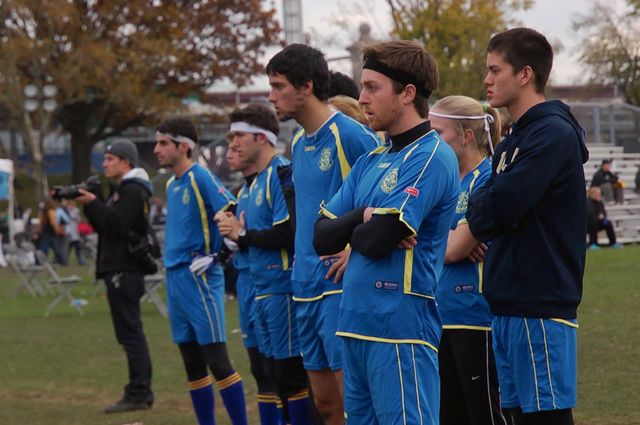Originally, Farzad Sangari was not looking to make a full-length documentary. He was just hoping to make a five-minute documentary for a class he was taking in 2011 as a graduate student at UCLA’s School of Theater, Film and Television.
But one day as Sangari was walking across campus, something strange caught his eye. Students were running around while holding broomsticks between their legs and throwing balls through hoops at both ends of the intramural field. Some of them were chasing a person dressed in gold and trying to grab a flag that was tucked into that player’s waist.
“So I just stopped and watched them for a while,” Sangari said. “And I remember thinking how fun and original this was. But then I also noticed that I wasn't the only one watching them practice. There were a lot people watching them play. For me, that was the impetus of the project.”
Now, three years later, Sangari "project" has grown into “Mudbloods,” a 90-minute documentary he directed and co-wrote about collegiate quidditch, a magical sport played on flying broomsticks that originated from the Harry Potter book series. Sangari's film follows the UCLA quidditch team’s bid for the 2011 Quidditch World Cup held in New York City.
And while the team didn’t capture the prize, Sangari and his partners in the film have been victorious. “Mudbloods,” which just premiered at the highly selective and prestigious AFI Documentary Film Festival in Washington, D.C., will open in select theaters this fall. The movie will be available on iTunes and on DVD in October.
“I don’t think this film could have been possible without the community of UCLA,” said Eric Martin, another UCLA film school alum who co-wrote the film with Sangari, “not just the tightknit quidditch community, but the film community and the people at the film school. Half the production team came from the school.”
The odd thing is that few of the film's makers knew anything about quidditch outside of what they read in the Harry Potter books.
“I'm not a big Harry Potter person, and I had never heard of real-life quidditch before, but somehow I immediately knew what they were doing,” said Sangari.
The book version of the sport features witches and wizards zooming in, above and around a stadium, ducking and dodging balls called bludgers, which are magically designed to knock them off their broomsticks. Other players, called “seekers,” look for the treasure of the sport: a golden, winged, flying ball dubbed a snitch.
Earth-bound quidditch had to be adapted by college student “muggles” — a magical word also from the Potter series for non-witches and wizards. So there’s no flying, and the snitch is someone dressed in gold.
Sangari’s film delves into the world of quidditch and the quidditch “haters” who haven’t yet recognized the sport’s merits.
“I hope [the film] makes people think about how far their imagination can potentially take them,” Sangari said. “The film isn't just about adapting something that should be impossible into a sport that has an organizing body, fans, a big annual tournament, smaller regional tournaments, etc. The film captures the ramifications of that creative endeavor. Essentially, this entire [sport] was made by college kids. They just decided to do this impossible thing, and they did it.”
Tom Marks, then-captain and founder of the UCLA quidditch team who graduated in 2013, stars in the documentary. He was Sangari’s inspiration to make the film.
“Tom was the key,” Sangari said. “He immediately trusted me and gave me a lot of access. I think he could tell how I wanted to approach the film. I wasn't going to be there for a few practices, then disappear and make something that didn’t represent them and who they are. Fortunately for me, the team let me in and included me in their journey.”
Marks said Sangari’s project started small. “And then a five-minute documentary turned into a 15-minute documentary,” then a half an hour, and finally an hour and a half. “We were never sure how big the movie was going to be,” he said.
“Mudbloods,” was crowd-funded with nearly $27,000 raised largely through Kickstarter. Donors were a mix of family, friends and total strangers, said Martin.
“To have so many people express their interest and support just made us even more excited to make the best film possible,” said Martin, who got involved with the film in 2013 when Sangari asked him to help craft a story out of the hundreds of hours of footage.
Marks said the sense of community inherent in quidditch allows the players to be almost impervious to the abuse heaped on players by those who make fun of the sport. “People make the same jokes so much that you stop caring,” he said. “You can make fun of the fact that we’re nerds and that we’re riding on brooms. We’ve heard it. We’re gonna go have fun now.”
To make it to the 2011 World Cup, Marks said, the team had to raise $10,000 for airfare and hotel costs, which they did almost entirely through T-shirt sales. The team also felt the need to step up their fitness training.
“We even did a practice at 5 a.m. to get used to the time difference and the cold of New York,” Marks recalled.
By the end of the film Martin said that he hopes people can view quidditch with more of a sense of legitimacy.
“Every sport, if you really break it down, is about moving a ball from one place to another,” Martin said. “When you look at a sport that way, it does kind of look silly.” But the essence of sport, he explained, “is this expression of passion and drive and competition that’s really inherent in human nature, and we love to watch that.”
Quidditch, he said, “is just a different expression of those things.”





